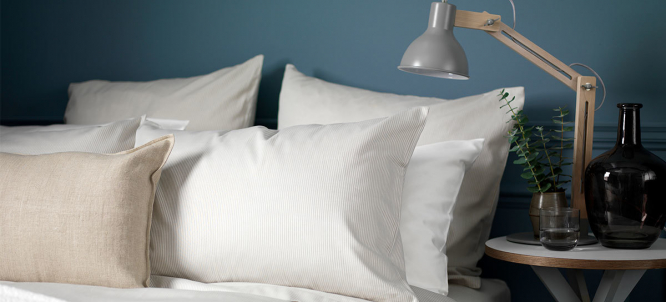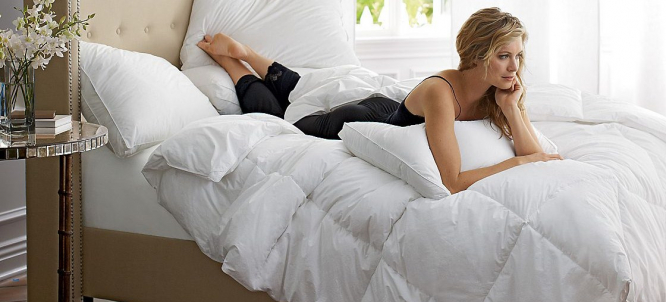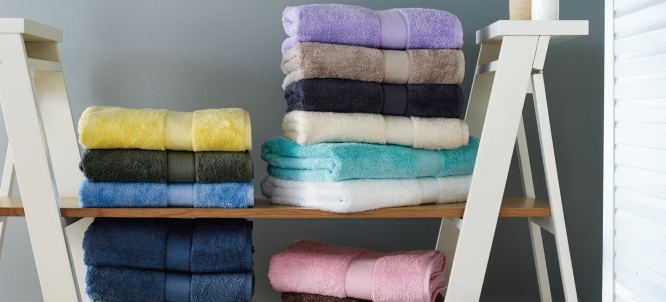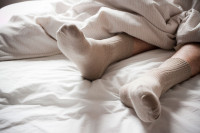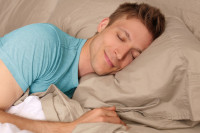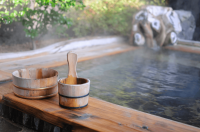29 science-backed tips for a better sleep
We all want to have a better sleep, but sometimes it is difficult to achieve it
Our company has gathered the most useful, science-backed tips to facilitate falling asleep, encourage the deep and restful sleep, and tackle insomnia. They will help you wake up rested and refreshed.
1. Bedtime alarm. If you are constantly trying to go to bed earlier, but you never achieve a routine, think about setting a bedtime alarm which to remind you that it’s time to go to sleep.
2. Say no to alcohol before bedtime. Although drinking before going to bed may make it easier to fall asleep faster, it is also the reason to often wake up in the middle of the night.
3. Grandma socks. Some people experience cold feet and toes. Scientific studies report that warmer feet can stimulate the falling asleep process.
4. The dark room. Even the most unnoticeable light, like the one from your digital clock, may prevent you from falling asleep. If you are not able to avoid the irritation, think about the possibility to use a sleep mask.
5. The right temperature. The excessively warm or cold room could be the reason for your low-quality sleep. The optimal room temperature during sleep is 15-19 ºC.
6. Switch everything off. One hour before going to bed, draw the curtains, switch off all devices–telephones, the TV, and the laptop. The brain analyzes the light as an indicator to wake up and stay alert; therefore you have to send the opposite signal shortly before going to bed.
7. Reduce caffeine intake. Its excessive use, especially in the afternoon, can lead to middle-of-the-night awakening.
8. Exercise regularly. According to research studies carried out in the United States in 2013, the people who regularly workout experience a considerably better sleep. It won’t take a lot of effort–only a few minutes of physical exercise per day will improve the quality of your sleep.
9. Avoid excessive eating before sleep. The human body has not been designed to effectively process food during sleep, therefore we recommend avoiding the heavy meals before going to bed. The proteins are difficult to digest, but if you still want to have a bite, choose something lighter.
10. Use appropriate colors. The right colors will stimulate the restful sleep. Read more about color therapy and how the colors can influence your sleep and state of mind here.
11. Bed is designed only for sleep. Does reading in bed actually make you feel relaxed? Yes and No. Each page of your novel or detective book requires your emotional and intellectual attention, and this can be more distracting than truly relaxing. If you really like to read than choose a lighter genre.
12. Create a quiet bedroom. If you experience problems with falling asleep due to unpleasant or irritating sounds, your partner’s snoring, or the tick tacking of the clock, then we recommend using earplugs.
13. Pets. No matter how much you like to cuddle, the purring and pet hair can lead to problems with you sleep.
14. Mattress. Sometimes the real reason for tossing and turning in the bed can be found underneath. That’s right; the uncomfortable mattress could be the cause for your insomnia. No matter whether it has lost softness or is too short, the important thing is to avoid any delay. Experts recommend changing the mattress every 5-10 years.
15. Nap. A short nap during the day (no more than 30 minutes) will not disrupt your night sleep; on the contrary, it will even improve the memory, alertness, and your work.
16. Separate covers. If your partner is constantly hogging the covers, it’s a good idea to try using separate ones. In our online store, you will find different models of bedding sets with two covers, the so called maxi bed linen.
17. Keep a constant routine. When you have sleep problems, it’s a good idea to stick to one and the same wake up routine, even during the weekends/holidays. If you spend the morning lolling around in your bed or you go to bed too late, this only will disturb your natural body clock.
18. Schedule your daily tasks. Do you try to fall asleep, while constantly thinking about the next day? Experts recommend drawing up a preliminary plan for the next day, thus avoiding any sleep disturbance.
19. Meditation or prayer. These activities can help you relax, which in turn makes it easier to fall asleep faster. Try to imagine that you are in some isolated and quiet place.
20. Pleasant odors. An American study carried out in 2005 reveals that the pleasant aromas accelerate the falling asleep.
21. Warm bath. Taking a warm bath before going to bed helps you fall asleep faster and deeper. This is due to the increase of our body temperature during the bath and its decrease once we go out, thus imitating the natural process that takes place in the body before falling asleep.
22. Write. When nothing else works, take a pen and a sheet of paper and write down everything that bothers you. This can help you fall asleep faster.
23. Sunlight. Enjoying the morning sunshine for at least 15 minutes can have a beneficial effect on your health. This assists the regulation of the natural body clock.
24. Snoring. This is a commonly seen problem that leads to many other misunderstandings in the personal relationships. Try out the side-lying position instead of sleeping on your back, avoid drinking alcohol before going to bed, and think about a diet or some physical exercises, if you are overweight. You can find more tips to tackle the snoring problem here.
25. Sleep apnea. Your snoring could be a result of sleep apnea. The condition is characterized by short breathing interruption. Consult your health physician.
26. Buy a new pillow. Sometimes, you can solve the sleep problems by finding the right pillow. Its choice must be made in accordance with your prevailing sleeping position. For stomach sleepers, we recommend a soft type, for those who prefer the side-lying position–a firm one, and for people sleeping both on their back and left/right side–a pillow with medium hardness.
27. Don’t drink too much water before bedtime. This will just cause more often middle-of-the-night bathroom trips.
28. Quit smoking. The nicotine like caffeine is a stimulant that keeps you awake at night. The smokers more often report an early morning fatigue compared to the non-smokers.
29. Think about a therapy. If you have more serious sleep problems, consider consulting a health practitioner.


